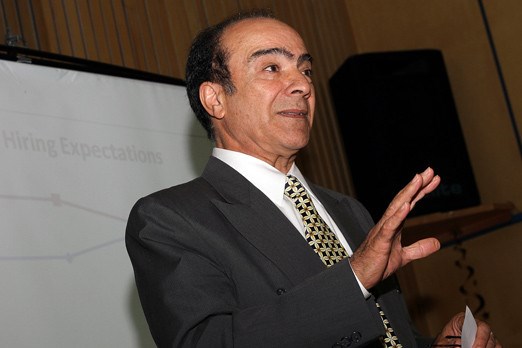More than half of small businesses surveyed said they plan to hire new employees in 2011.
But while entrepreneurs remain more optimistic of their economic futures, not all is rosy in the financial world, and Thunder Bay could be hit hard and left behind if things don’t change.
Thunder Bay Ventures Royden Potvin, who on Wednesday delivered his organization’s 14th annual business survey, said federal and provincial belt tightening combined with a lack of skilled labour in the city could be a recipe for disaster.
“We’re facing a provincial deficit of a magnitude we’ve never seen before. The federal deficit we’re not even sure how big it is,” Potvin told a small gathering at the Finlandia Club. “I’m concerned for the two to three-year future of Thunder Bay with the dependency on transfer payments from the government.
“My sense is there’s going to be cutbacks, there’s going to be job losses and that should be of concern to everyone in Thunder Bay.”
Lakehead University business dean Bahram Dadgostar said there are plenty of countries, including China and India, that are looking to Ontario for its resources, but without the labour pool or proper resources to get it from point A to point B, they’ll go elsewhere.
That goes ditto for companies looking to invest from within the North American market, especially in places like the Ring of Fire and other mining opportunities.
“We don’t have a connection to the North, we don’t have those things,” Dadgostar said. “We have to look at what infrastructure is required to attract industry. People around the world are looking for opportunities, but they go where (they can make the most money).”
In other words, companies won’t build railways and roads, he said.
Potvin also said it’s time governments stop looking at the forest industry as a viable one, at least not its present form, albeit a somewhat shattered one.
The survey, which showed forestry with the lowest expectations for growth potential, slightly more than half that of the mining industry, suggests businesses are looking elsewhere, as it should be Potvin said.
“It pales today to what it once was and other sectors have far outstripped it in terms of economic impact and employment,” Potvin said. “I’m not sure why it continues to hold as much sway with politicians.”
Not everyone agreed.
Thunder Bay Chamber of Commerce president Harold Wilson spoke up, saying his take on the survey shows people still think forestry has a significant impact on the local economy.
Wilson suggested the conclusions being drawn by Potvin might be erroneous.
“There’s still opportunity here for the forest industry. Yes it’s been quite decimated, but that doesn’t mean there’s still not potential. The interest in the wood allocation is an example of that,” Wilson said.
“So when I look at this survey, it is very positive, and it’s saying the forest industry will still have an important role in Thunder Bay. Maybe not the primary, maybe not the pulp and paper part of it.”
Respondents, ranking various industries from one-to-five based on their importance to the local economy, seem to bear out Wilson’s line of thinking. Forestry got a 3.48 score, which though the lowest of six industries surveyed, is a generally positive result.
The survey also contained plenty of other interesting tidbits.
Seventy-six per cent of respondents have seen a negative impact from the HST; only 13 per cent think governments should raise taxes to combat growing deficits; 30 per cent say the city is proactive and aggressive when trying to attract new business; and only 26 per cent, up one per cent over 2010, think city council is doing a good job representing their business.
The survey, which reached out to firms of 35 or fewer employees, collected information over a three-week period during May and June.
More than 700 questionnaires were sent out, with 93 returned.
Sign in or register
- Messages
- Post a Listing
- Your Listings
- Your Profile
- Your Subscriptions
- Your Likes
- Your Business
- Support Local News
- Payment History
Registered Users
Already have an account?
New Users
Create a free account.
